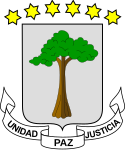
Back Partit Democràtic de Guinea Equatorial Catalan Partido Democrático de Guinea Ecuatorial German Demokratia Partio de Ekvatora Gvineo Esperanto Partido Democrático de Guinea Ecuatorial Spanish Päiväntasaajan Guinean demokraattinen puolue Finnish Parti démocratique de Guinée équatoriale French Partito Democratico della Guinea Equatoriale Italian 赤道ギニア民主党 Japanese Partido Democrático de Guinea Ecuatorial Dutch Partia Demokratyczna Gwinei Równikowej Polish
This article needs additional citations for verification. (December 2009) |
Democratic Party of Equatorial Guinea Partido Democrático de Guinea Ecuatorial | |
|---|---|
 | |
| Abbreviation | PDGE |
| President | Teodoro Obiang Nguema |
| Secretary-General | Jerónimo Osa Osa Ecoro |
| Founded | 11 October 1987 |
| Headquarters | Malabo |
| Ideology | |
| Political position | Big tent |
| International affiliation | Centrist Democrat International (observer)[9] |
| Chamber of Deputies | 100 / 100 |
| Senate | 70 / 70 |
| Party flag | |
 | |
| Website | |
| www | |
| ||
|---|---|---|
|
President of Equatorial Guinea 1979–present
Government
 |
||
 |
|---|
The Democratic Party of Equatorial Guinea (Spanish: Partido Democrático de Guinea Ecuatorial, abbreviated PDGE) is the ruling political party in Equatorial Guinea. It was established by President Teodoro Obiang Nguema Mbasogo on 11 October 1987.
Prior to 1991, the PDGE was the sole legal political organization in the country. Still, the PDGE has been the dominant party since its inception, and it typically wins almost all seats in the Parliament. In the 2004 legislative election, 98 of 100 seats were won by either PDGE members or "opposition" parties that support Obiang; in the 2008 legislative election, the PDGE and its allies won a total of 99 out of 100 seats.[10] There have never been more than eight true opposition deputies in the lower house, and the PDGE and its allies have won every seat in the upper chamber since its inception in 2013. Consequently, there is no substantive opposition to presidential decisions.
Similarly, Obiang typically wins 95 to 99% of the vote in presidential elections, with the opposition regularly calling for boycotts. In the 2016 presidential election, however, Obiang won around 93% of the vote, a new low for his presidency.
The party has an extremely narrow base, which is the Esangui clan of the Fang tribe, located in the Mongomo region of Río Muni. Since independence in 1968, Equatorial Guinea has been ruled by a single family; the first president, Francisco Macías Nguema, was overthrown by his nephew, Obiang, in the 1979 coup d'état. The party has been criticized for acting in a very authoritarian manner and teaming up with the government to inform on political dissidents. The party is considered by the vast majority of international observers to be corrupt.
- ^ "Equatorial Guinea country profile". BBC News. 8 May 2018.
- ^ Simon, Allison (11 July 2014). "Equatorial Guinea: One man's fight against dictatorship". The Guardian. Retrieved 9 May 2017.
- ^ "Equatorial Guinea: Ignorance worth fistfuls of dollars". Freedom House. 13 June 2012. Archived from the original on 23 June 2012. Retrieved 19 January 2017.
- ^ Rondo Igambo, Muakuku (June 2006). Conflictos étnicos y gobernabilidad: Guinea Ecuatorial. Ediciones carena. ISBN 978-84-96357-26-6.
- ^ Equatorial Guinea Business Opportunity Yearbook. International Business Publications, USA. February 2000. ISBN 978-0-7397-2153-7.
- ^ "We've seen Donald Trump's type of populism in Africa, it always ends in tears". 30 May 2016.
- ^ "Equatorial Guinea: Freedom in the World 2022 Country Report". Freedom House. Retrieved 2023-06-08.
- ^ "Ideología".
- ^ "Osa Osa Ecoro welcomes the president of the IDC". Archived from the original on 2019-07-10.
- ^ "Guinée équatoriale: le parti présidentiel grand vainqueur des législatives" Archived May 20, 2011, at the Wayback Machine, AFP, May 9, 2008 (in French).
